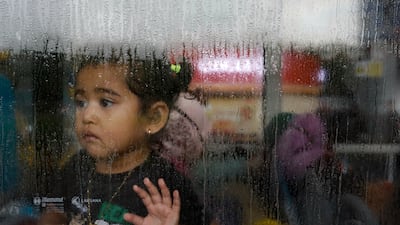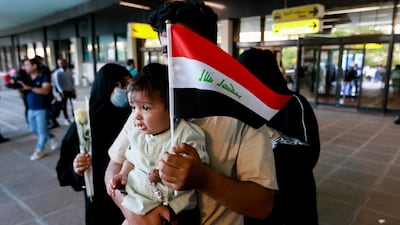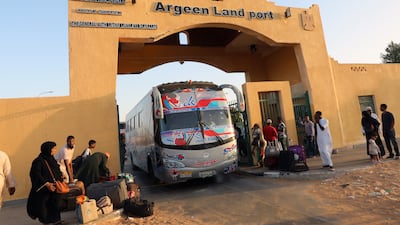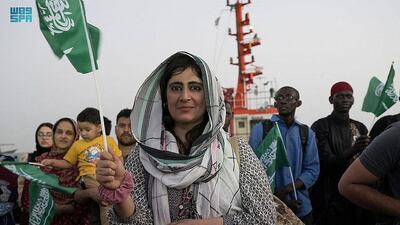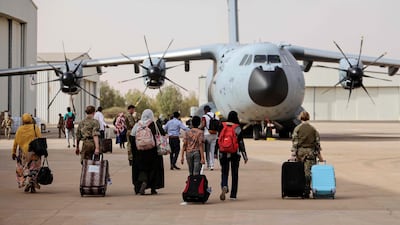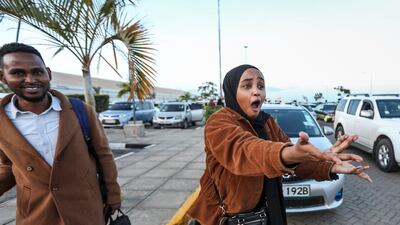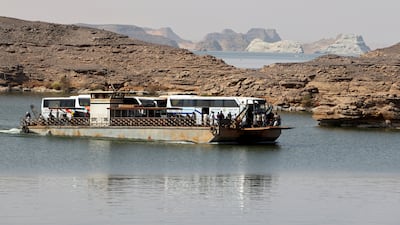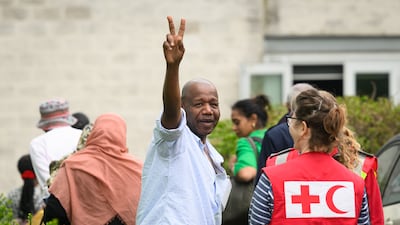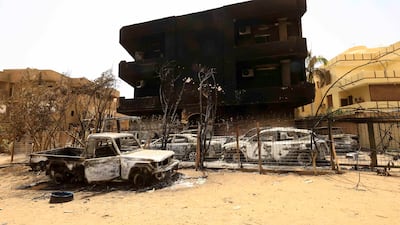Sudanese surgeons who volunteered to leave their lives in Saudi Arabia and return home to help during the ongoing conflict have described a medical sector in crisis.
Sudan's two-month war has killed more than 1,800 people in the capital and restive Darfur region, according to the Armed Conflict Location and Event Data Project. The UN says up to two million people have been displaced.
Omer Abdulrahim, 48, is one of four doctors living in Saudi Arabia who were chosen to visit Port Sudan last month to assess the situation of three hospitals and a kidney dialysis centre.
Dr Abdulrahim, consultant vascular surgeon at the King Faisal Specialist Hospital and Research Centre, was chosen for the trip by the King Salman Humanitarian Aid and Relief Centre, or KSRelief, after answering a call for volunteers.
“I had never thought I'd ever go back to my country on board an aid flight,” he told The National.
Dr Abdulrahim and three others travelled to Port Sudan aboard a chartered aid flight carrying about 30 tonnes of food and medical supplies on May 28.
KSRelief has sent 13 planes full of aid to Port Sudan since the conflict between the paramilitary Rapid Support Forces and the Sudanese army began on April 15.
“The situation was depressing,” Dr Abdulrahim said.

“State health officials told us that the medical situation was catastrophic. They were optimistic that things would improve,” he said.
First, Dr Abdulrahim and the team went to the government-owned Osman Digna hospital which has a capacity of about 200 beds.
The diagnostic imaging department was out of service and being used to store equipment, Dr Abdulrahim said.
Operating theatres were also unusable.
“We encountered a diabetic man with a septic leg who needed immediate medical intervention,” he said.
Known as diabetic foot, the condition could cause infection to spread to the rest of the body.
“The hospital could not take any action because the operating room was not equipped.
“Much of the facility was not functional. It's effectively not a hospital.”
Next, the team visited Port Sudan hospital, one of the country's oldest, established in the 1920s. The situation there was similar, he said.
Doctors 'working blind'
Isam Eldin Salih Osman, who heads the vascular and endovascular surgery department at King Saud Medical City, accompanied Dr Abdulrahim. He said in some facilities, doctors were “working blind” due to the lack of diagnostic imaging.
“There were also shortages of ventilators as intensive care units were out of service and anaesthesia and sterilisation equipment were lacking,” he said.
More than 70 per cent of Sudan's hospitals are out of service, the Federal Ministry of Health said. In addition, Sudan's doctors union said there have been continuous attacks on ambulances as well as looting of medical facilities and blood banks.

Sudanese doctors have also been sounding the alarm over the lack of dialysis equipment and supplies.
“We visited a dialysis centre in Port Sudan. Out of 38 dialysis machines, nine were not working,” Dr Osman said.
“They were working with only 29 machines, while accommodating their regular patients and people who have come in from Khartoum for treatment.”
Doctors at the centre were “enthusiastic” about doing anything they can to develop the facility, Dr Abdulrahim said.
“They were working like one family. They increased the number of shifts and were working virtually around the clock just to serve the patients,” he said.
“But with 100 to 150 more people from Khartoum, they need at least 20 new machines to be able to treat everybody.”
Both doctors described the case of a 10-year-old boy with renal failure. His catheter, a small hollow tube that is inserted in a person's vein to allow dialysis to take place, was broken and dirty.
“This is very dangerous because it can rapidly spread poison, to the superior vena cava, to the heart,” Dr Abdulrahim explained.
The team of doctors from Saudi Arabia quickly searched for a replacement.
“We were able to find him one of the last few catheters in Port Sudan that was suitable for his size, due to him being a child,” he said.
But this is only a temporary solution. As of the team's departure, the child had yet to receive surgery for the replacement catheter.
“These items should have been available,” Dr Osman said.
Dr Abdulrahim said that feelings of sadness remained long after his return to Saudi Arabia.
“The situation was dark, depressing and gloomy,” he said.
